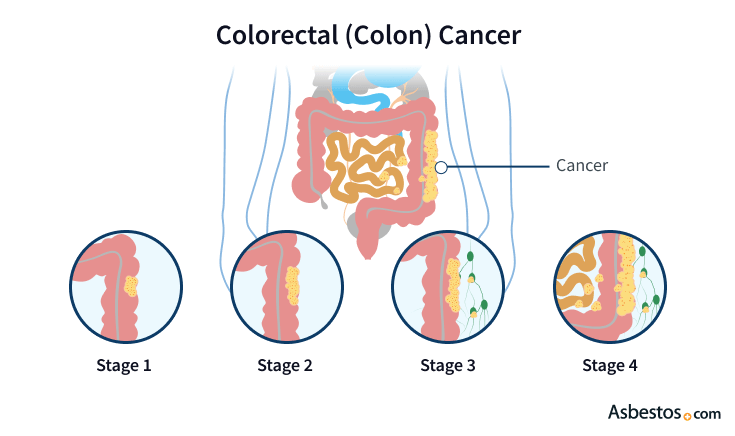Colorectal (Colon) Cancer and Asbestos Exposure
Colorectal cancer is a disease of the large intestine or rectum. It's the second-leading cause of cancer-related deaths in men and the third-leading cause in women in the United States.

What Is Colon Cancer?
Colon cancer, or colorectal cancer, is a disease that involves abnormal cell growth in the large intestine. Polyps, which are abnormal growths, can grow in the large bowel and over time some can become cancerous.
There were approximately 106,180 new cases of colon cancer in the U.S. in 2022. Risk factors include smoking, heavy alcohol use, Type 2 diabetes, a family history of colorectal cancer and obesity.

Medical research on the relationship between colorectal cancer and asbestos is mixed. Some studies suggest a definitive cause and effect culminating in higher colorectal cancer rates among people who worked with asbestos. Other studies show little statistical basis for such a claim.

Understand your diagnosis, top doctors and ways to afford care.
Get Your Free GuideColorectal Cancer and Asbestos Research
A 2019 research report reviewed more than 40 cohort studies and concluded that the risk of colorectal cancer mortality increases as the level of asbestos exposure rises. Occupational exposure to asbestos was also the impetus for a major cancer study between 1984 and 2004.
In the study, experts looked at 3,897 patients who were exposed at work to asbestos. Then they reviewed the potential link between asbestos and various specific cancers and found that colorectal cancer was elevated among men who were occupationally exposed to asbestos. Authors of the study said age, a history of smoking and other factors were adjusted in the results.
A 1995 study found male heavy smokers who were exposed to asbestos were 1.3 times more likely to develop colorectal cancer. Another study from 1994 found asbestos workers exposed to amphibole asbestos were 1.4 times more likely to develop colorectal cancer.
A historic study of 632 insulation workers, an occupation well-known for asbestos exposure, yielded similar results. Workers who entered the industry before 1943 were monitored until 1962. The authors had expected 5.2 deaths, but 17 colorectal cancer deaths were recorded suggesting asbestos exposure could increase risk.
Conflicting Data
A 2006 review of 32 scientific studies the examined the potential connection between asbestos and colorectal cancer. No statistically significant causal relationship was found.
One report published in International Archives of Occupational and Environmental Health in 1994 acknowledged that links between asbestos exposure and colorectal cancer exist in other studies and reports. But the authors found contradicting evidence within the context of their study.
Researchers studied 261 cases of colon and rectal cancer and 183 control cases in southeast Michigan. Workers from occupations with historically known asbestos exposure were analyzed.
Recommended Reading


